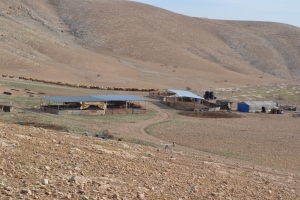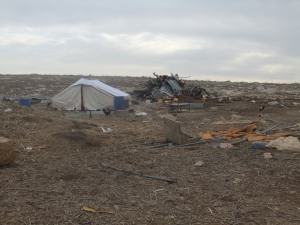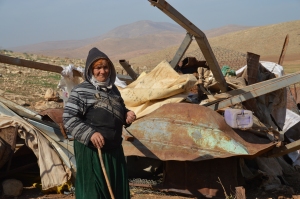The small Palestinian village of al-Hadidiya is located in Area C in the northern Jordan Valley, near the illegal Israeli settlement of Ro‘i. The approximately 90 residents earn their living as shepherds and farmers. Al-Hadidiya is not hooked up to the water grid and the average water consumption is 20 liters per person per day ~ far less than the 100 liters recommended by the World Health Organization. The village is cut off from any regular water supply despite its proximity to a Mekorot (Israeli national water company) pump, which provides water to the nearby settlements. The per diem water allotment per person in these settlements, for household use alone, is over 460 liters ~ at least 23 times the consumption of water in al-Hadidiya. The following is excerpted from the recent reports of our EAPPI Jordan Valley Team ~ If I didn’t know it to be true, it would be unbelievable…
Wednesday, November 25 ~ Our EAPPI team goes to the village of al-Hadidiya to follow up on a demolition alert for the upgraded road. At 6:15 AM, two military jeeps and one bulldozer arrive in the village and in 1.5 hours demolish 100-200 meters of road before they are stopped by the Israeli Civil Administration ~ it seems the army has acted on its own without an official order.
Thursday, November 26 ~ Our team returns to al-Hadidiya in response to a UN alert. At 7:00 AM Israeli forces arrive with four military vehicles, two civilian vehicles, and two bulldozers to demolish the structures of three families. Abu Sakr’s home is the first stop. They give the family very little time to retrieve their belongings before they demolish everything ~ animal shelters, livestock pens, living shelter, kitchen, the taboon oven, and a shelter for receiving visitors. The only things that remains standing are the toilet, the solar panels and the water tanks. Abu Sakr‘s 20-year-old daughter, who is three months pregnant, is pushed by a soldier (one witness said she was punched in the stomach). She starts bleeding from her uterus. An ambulance arrives to take her to hospital ~ The army moves on to two other families: Abu Sakr’s son and Mohammed Ali Bsharat. In the end, some 14 structures are demolished ~ 19 people including six children are left without homes. More than 170 sheep and goats and a lot of pigeons are also left homeless. And it is winter.
Friday, November 27 ~ Someone from the village calls the team. The Israeli military is back in al-Hadidiya, threatening the Jordan Valley Solidarity (JVS) volunteers, confiscating their IDs, and demanding they destroy the structures they had rebuilt. The military tells the families to leave the area within 24 hours or else they will shoot them. Villagers request international presence for sleep-overs for the next few days.
Saturday, November 28 ~ Our team responds to a phone call from a villager. Two emergency donor-funded tents arrive and are set up. Within an hour four Israeli soldiers and a hummer are in the village ordering that the tents be taken down, but the military does not produce any demolition orders. After the soldiers leave, the EAPPI team is invited for tea and lunch with Abu Sakr’s family.
Sunday, November 29 ~ An international staying overnight in the village calls our team. At 4:00 AM the soldiers are back. They force Abu Sakr’s son to take down the tent in which the internationals are sleeping. The Bsharat family say they are sleeping outside tonight since they are afraid the soldiers will return. Abu Sakr has a fever.
Monday, November 30 ~ EAs go to the village to show solidarity and provide protective presence. The army comes at 9:00 AM with five jeeps and one truck. They confiscate the two humanitarian tents. Abu Sakr is lying on a mattress on the spot where his structure to welcome guests had been standing four days earlier. He does not look good and says he is feeling a big pain inside. His friend takes him to hospital. The EAs stay for a few hours and play with the children. Tonight the family will be forced to sleep in the open. It is cold.
Tuesday, December 1 ~ EAs stay overnight in al-Hadidiya. Abu Sakr and his wife, Rokaya, tell them that the military had come late Monday evening and had taken even the plastic sheeting on which the family was sleeping. Late at night, a truck delivers humanitarian aid tents, but set-up has to wait until morning. The family and EAs sleep outside with only plastic sheeting to cover against the rain.
Wednesday, December 2 ~ Early in the morning, the three families are busy setting up the new tents ~ they have received seven large shelters from a French aid organization. At 10:00 AM a delegation of representatives from the Italian, Spanish and Belgian consulates arrives together with key people from other organizations. Rokaya speaks to the two women representatives about how difficult it is for her as a mother ~ “It’s hard for my children to study now, and the teacher gets angry with them, and the girls don’t want to go to the school. It’s harder this time with the demolitions [their homes have been demolished several times] since they [the soldiers] come back to even take the plastic sheeting ~ they show no humanity. I was born here and lived all my life here. I lost four of my children at an early age and their graves are here. They can try to make me leave, but I will never leave.”
Thursday, December 3 ~ Our EAPPI team responds to a UN alert about a demolition and confiscation of post-demolition assistance. According to Abu Sakr, the Israeli military forces arrive around 9:45 AM with two military jeeps, two civilian vehicles, and a truck-mounted crane. There are two officers, ten soldiers and eight to ten workers. They dismantle the four shelters which had been set up, putting the iron bars together and packing them carefully. The same for the plastic sheeting. This surprises Abu Sakr. He says: “Now they calculate everything they do because they are afraid of EU pressure [if they demolish the tents].” The soldiers drive away with the four dismantled shelters as well as the three shelters that had not yet been set up.
Friday, December 4 ~ The team is informed that the army is in al-Hadidiya to check and see if anything has been built since yesterday. EAs go to the village to show solidarity with the community. Donors propose to again provide humanitarian tents, but Abu Sakr says they should wait until Monday when his lawyer reports that he can expect word from the courts, as all of this destruction and harassment has transpired without proof of military orders. EAs have coffee with the family around the fire, listening to Abu Sakr’s stories and his vision for the future. He is planning a sit-in at the EU office in Ramallah. Whatever the courts decide, one thing is for sure: “We will build again,” he says. In the meantime, the families are sleeping outside.
According to the Israeli Human Rights Group, B’Tselem: “These actions by the Israeli authorities are part of ongoing efforts designed to expel Palestinians from Area C by making their lives intolerable. Such actions, whether direct or indirect, constitute the forcible transfer of protected persons inside the occupied territory in contravention of international humanitarian law.”
How does one respond to such senseless, inhumane, cruel, shameful and inexplicable actions by the Israeli government? Certainly their usual “security card” can’t be played here in this small village of 90 vulnerable shepherds and subsistence farmers ~ What to say? ~ What to do?








These actions by the Israeli government and military would never be believed without your witness
of what happened. It is important you are there.
It’s hard to believe the cruelty and harassment towards the most vulnerable people who have nothing to protect them. It’s hard to believe that even international aid is destroyed or stolen. The only thing they have is your presence and witness, and the hope that the world will see what is happening. On behalf of many, thank you for your continuing presence and emotional support to these people.
Anne
I feel a strong aversion towards Israel as I read and reread these words. And then I see the strength and resilience of these amazing people who love the land and the generations of people who have called it home. My heart aches for the price they pay for their convictions. Those who commit these atrocities have become a soulless people. The love and courage of the witnesses and aid workers are the light beam that holds hope. Thank you.
It’s so hard to comprehend this level of injustice. Thanks for your presence so we know what is happening.
It is truly unbelievable!!! These people face such injustice! Thanks for the work, Dawn. It is so important that this information gets out.
This is not only unbelievable and unjust but also contravenes Geneva conventions re humanitarian aide and treatment of NGO’s. I am thinking the Israeli government will say that they are unaware that these things are happening and that it must be some rogue military folks or worse than that they likely will spin it as terrorist activities dressed up as Israeli military. Somehow we must get pictures as it is happening and insider information that the military has ordered these activities. I remember the impact that the movie on the ‘Bantustans’ smuggled out from South Africa had upon the changing of the worlds attitude. Too bad we still don’t have Berkley Studio. I am furious!
I am getting more and more disgusted with the Israeli government acting as though they are the victims rather than the aggressors!
Pingback: Diez días en la vida de Al-Hadidiya, una pequeña aldea palestina | Palestina en el corazón